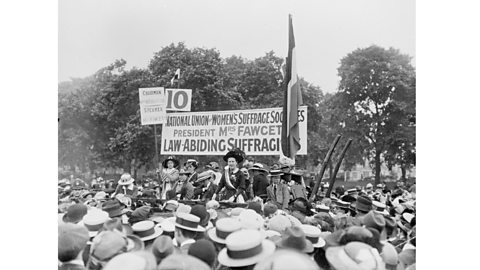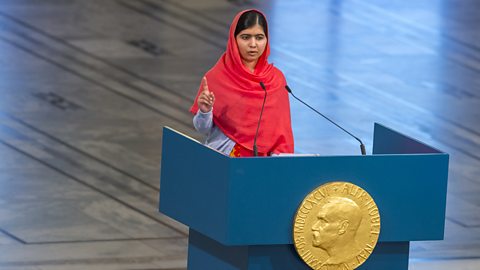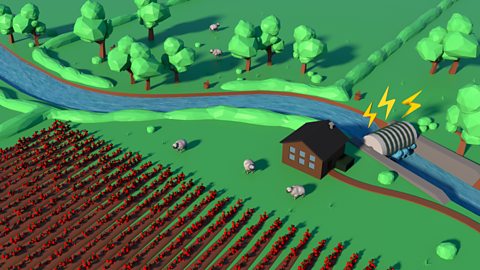Female revolution
It would be easy to assume that gender equality is universal because we see more and more women in influential roles in many fields. However, this is not the case, especially in less developed countries.
Of the 800 million people that live in extreme poverty globally, they are more likely to be women than men according to the United Nations.
Over the last decades, some progress has been made. More girls now attend school, fewer girls are forced into marriage, and laws are being reformed to advance gender equality.
But despite these changes, some challenges remain. Women are still underrepresented at all levels of political leadership. In some countries social norms mean that females are not given equal opportunities.
Watch: Female revolution
Watch this short clip to learn about some remarkable women and their achievements.
There’s no doubt about it. We’ve come quite far as a species. However, we still have a long way to go in several areas - one of the most significant being gender equality. It’s truly frightening how little gender equality there is in the world. There’s a good reason why it’s riding high at number five in the sustainable development goals set by the United Nations. And while it is true that gender equality is a major problem for developing countries, that’s not to say that there isn’t some work to do here in Wales.
At the beginning of 2019, women in Wales were paid close to 25 per cent less than their male counterparts for doing the same job. At the same time, among the 100 top businesses in Wales, only around five were run by female CEOs.
There is some room to be thankful. Women have been relatively well-representedin Welsh politics, for example, as opposed to many other countries. But there’s no time to rest on our laurels. And for inspiration, we can take a leaf from the history books. In the 1970s, Betty Campbell did what was seemingly impossible, amid hostility and opposition from some parents, by becoming the first black head-teacher in Wales – a huge step for both gender and race equality. She died in 2017, and in 2019 the public voted to place a statue of her in the center of Cardiff to commemorate her life and achievements.
In 2009, an anonymous blog was written about the fight for female education in Pakistan. It caused a stir around the world, and nowhere more so than in Pakistan itself. It soon became apparent that the writer was an 11-year old schoolgirl. Malala Yousafzai. Once her identity became known, threats began to be made against her. In 2012, a gunman shot Malala in the head as she was travelling home from school.
But it would take more than a bullet to destroy her dreams. She survived. Her injuries were treated – first in Pakistan, and then in the UK. And through it all, she never stopped fighting. Malala started a fund to help pay for the education of young women, all around the world. She opened a brand new school in Lebanon and began working with the United Nations, whilst tirelessly campaigning for women’s education. In 2014, she became the youngest ever winner of the Nobel Peace Prize. By now, that once-anonymous blogger is known world-wide, simply as Malala.
While it’s true that equality is still some distance away, we can all play our part. What Malala, Betty Campbell, and countless other examples all teach us, is that small gestures really can make a difference. Who knows? Something you do today, no matter how small, could echo throughout history.
Suffragettes
The Representation of the People Act was passed on 6 February 1918. This was the first time that women had been given the right to vote in the UK. They had to wait until 1928 before they were granted the same voting rights as men.
The campaign to give women the vote in Britain began in the 19th century. The first petition on women's suffrageThe right to vote in an election. was presented to Parliament in 1832.
Women campaigned through local women’s suffrage societies. In 1897, Millicent Fawcett merged these societies into the National Union of Women's Suffrage Societies (NUWSS). They were known as the Suffragists.
In 1903, Emmeline Pankhurst and others formed the Women’s Social and Political Union (WSPU) when they became frustrated by the lack of progress. They were known as the Suffragettes and their motto was "Deeds not words".
They planned to use civil disobedience to cause disruption, but lack of government action drove them to commit more violent acts.

The leading Welsh suffragette was Margaret Haig Thomas. She blew up a post box in Newport, to show how strongly she felt about votes for women. She was sent to prison but went on hunger strike and was released after five days. She later became Lady Rhondda and was a successful businesswoman and journalist.
Women had still not won the vote by 1914, but then came the First World War. When the men went away to fight, women took paid jobs outside the home for the first time. They worked in shops and offices, and on farms to produce much needed food. Many worked in armaments factories, and some did jobs on the front line which did not involve fighting.
They proved that they could work as hard as men in a wide range of jobs and that they deserved the same rights.
Malala Yousafzai
Malala Yousafzai was born in Mingora, Pakistan in 1997. In 2008, her world changed when Taliban Forces took control of her town in the Swat Valley. They banned many things such as owning a television and playing music and prohibited girls from going to school.
In 2009, ≥…»ÀøÏ ÷ Urdu posted Malala‚Äôs anonymous blog, in which she wrote about:
- life under Taliban rule
- her desire to remain in education
- her wish for girls to have the chance to be educated and the opportunity to learn to read and write
She also spoke out publicly despite the dangers.
In October 2012, the Taliban punished her for speaking up for the rights of girls to be educated. A masked gunman boarded her school bus on her way home from school and shot her.
After initially being treated for her injuries in Pakistan, Malala was then flown to hospital in Birmingham. Malala was discharged from hospital in January 2013 and stayed in the UK with her family. She went on to further her education at Oxford University.
Malala has continued to advocate for female equality and the importance of education for girls. She has established the Malala Fund, a charity dedicated to making sure that every girl receives 12 years of education. The fund works in regions where girls miss out on secondary education.
In recognition of her work, she received the Nobel Peace Prize in December 2014 and became the youngest-ever Nobel laureate.

UN targets on female equality
The United Nations addresses the gender imbalance across the world with its fifth Sustainable Development Goal. It aims to achieve gender equality and empower all women and girls by 2030.
International commitments have been made on gender equality and have brought about improvements in some areas. Child marriage has declined and the role of women within governments has risen in recent years.
To meet this goal the UN has set certain targets, which include:
- to end discrimination against women and girls everywhere
- to eliminate all forms of violence against women and girls, including exploitation
- to eliminate all harmful practices, such as child, early and forced marriages
- to providing public services, infrastructure and social protection
- to make sure women are able to participate and have equal opportunities in leadership roles and in public life

More on Revolution
Find out more by working through a topic
- count3 of 3

- count1 of 3
